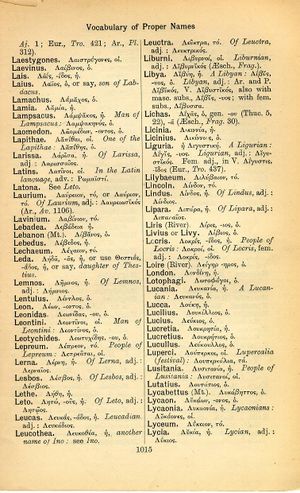Lyceum: Difference between revisions
From LSJ
Ὥσπερ αὐτοῦ τοῦ ἡλίου μὴ ὄντος καυστικοῦ, ἀλλ' οὔσης ζωτικῆς καὶ ζωοποιοῦ θέρμης ἐν αὐτῷ καὶ ἀπλήκτου, ὁ ἀὴρ παθητικῶς δέχεται τὸ ἀπ' αὐτοῦ ϕῶς καὶ καυστικῶς· οὕτως οὖν ἁρμονίας οὔσης ἐν αὐτοῖς τινὸς καὶ ἑτέρου εἴδους ϕωνῆς ἡμεῖς παθητικῶς ἀκούομεν → Just as although the Sun itself does not cause burning but has a heat in it that is life-giving, life-engendering, and mild, the air receives light from it by being affected and burned, so also although there is a certain harmony and a different kind of voice in them, we hear it by being affected.
(6_9) |
(D_5) |
||
| Line 4: | Line 4: | ||
{{Lewis | {{Lewis | ||
|lshtext=<b>Lycēum</b>: v. [[Lycium]]. | |lshtext=<b>Lycēum</b>: v. [[Lycium]]. | ||
}} | |||
{{Gaffiot | |||
|gf=<b>Lўcēum</b>, et mieux <b>Lўcīum</b>, ī, n. ([[Λύκειον]]), le Lycée [célèbre gymnase situé hors d’Athènes sur l’Ilissos et où enseignait Aristote] : Cic. de Or. 1, 98 ; Gell. 20, 5, 4 || lycée édifié par Cicéron dans sa campagne de [[Tusculum]] : Cic. Div. 1, 8 || autre lycée de l’empereur Adrien : Spart. Hadr. 26, 5. | |||
}} | }} | ||

